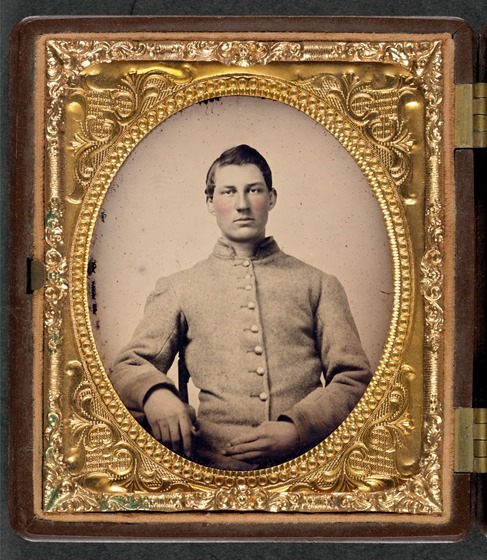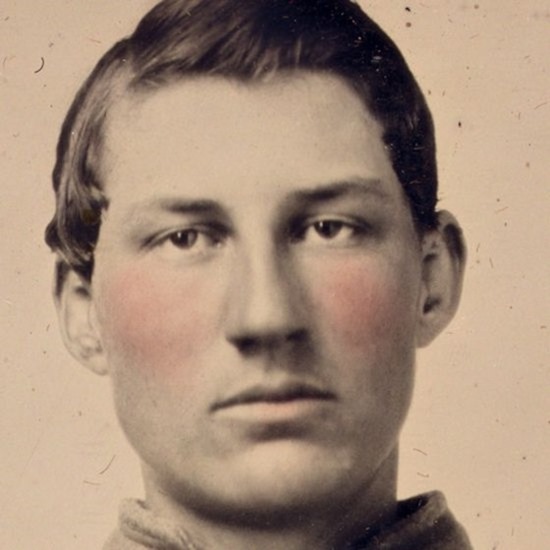Wednesday, 17th—Got breakfast, paid two dollars for it and crossed the River. Came on to Spring Place, got heel plates put on. Came out seven miles and staid all night. Camped.
Sunday, November 17, 2013
Tuesday, 17th—Went to Grandpaps this morning and got breakfast. Jim stopped at Mr. McDow’s to see Reuben Stround. Came on and we started from Grandpaps. Came up to Mr. Curtis and turned off to the right. Came up to Silvacoa and camped; got corn from a field.
Tuesday, 17th—The report in camp this morning was that General Sherman had been killed and his force captured on a railroad train east from Memphis. Another report this afternoon says that the train was attacked by the rebel cavalry, but that the troops formed a skirmish line and routed the rebels, and that Sherman is safe; but men were killed and wounded on both sides.
Bridgeport, Tuesday, Nov. 17. In camp. Warm and pleasant morning. No feed for horses. W. Hayes, Ed. Hayes, J. Ide, H. and D. Wallace returned from furlough, having followed us up to Iuka, then being obliged to return and go up the river by the way of Nashville. They came up on the cars this morning with plump and rosy cheeks. The boys greeted them with enthusiasm going to meet them from afar off. They were from HOME. Orders received at headquarters to send a commissioned officer and non-commissioned or private out on recruiting service. Of course much eagerness was manifested as to who should go. Many applications made I understood, but Lieutenant Hood and Sergeant Hamilton are the elected ones. I understand a like detail is to be made from each Company, but I doubt if they will bring back as many as go. The 4th Division crossed the river to-day. It is reported that we follow in the morning, leaving all wagons behind. Carriages were greased ready for the start. Wrote letters to brother Thomas and sister Mary. Am very anxious to hear from home. Ere this the draft has passed and I know not but the only stay and comfort of my aged and invalid parents is rudely torn from them. If such is the case, and I here in front of the enemy with my destiny unknown, I fear it will bring their gray hairs to the grave. God forbid! If he but be spared I will be satisfied, although I know not but that I have another year to serve after the Battery is mustered out. It is hard for me to think of the years going in this manner, when I had fondly hoped a part at least would be spent in the schoolroom, but I believe it is not lost. He that followeth his duty need not worry. His reward is certain, and it is truly a noble cause in which we are engaged. From the front I have heard nothing. It is reported that the rebs are withdrawing but I do not credit it.
We started one month ago to-day. Twenty of these days were on the road; 240 miles have been travelled. We have been transferred from the Army of the Tennessee to the Army of the Cumberland, and all of our record from this on will be with them.
17th. Sent Lewis to Russelville to see about rations. June came with load of flour weighing 4,000. 2nd. N. Carolina and 23rd Ind. Batt. in our Brigade drew rations. Saw post Commissary. No rations. Things begin to look a little dubious. Considerable running about for one day. Rode from Gap to camp with Lt. Pearson.
Monday, 17th.—Drew three days’ rations. Started on scout with two brigades. At Nickajack at sundown; cleaning blockade out of Gap. 12 M., about a dozen cannons fired.
November 17.—Poor Mr. Groover is at last released from all his sufferings. Last night at 9 o’clock his spirit took its flight. He died at peace with his God. His wife has been with him about a week, and is much consoled that she has had the privilege of ministering to his last wants. She has two children, and has lost two brothers, two brothers-in-law, and now her husband, in this unholy conflict.
Dr. Hughes, who is very kind to the patients, and doing all in his power to alleviate their sufferings, has had Mr. G. moved into a room by himself, and every thing about him as comfortable as possible , Mrs. and Miss Lowe, ladies of the place, were with Mrs. G. at the time of her husband’s death.
I have made the acquaintance of some very nice people here. Among them Mr. Dougherty’s family; he keeps a hotel near us. He has three married daughters, highly educated and refined ladies, He is what is called an Irish-Scotchman, and two of his daughters are named respectively, Caledonia and Hibernia. He is a native of that town of historic fame, Londonderry.
John Munroe, a member of the Second Alabama Regiment, died to-day. He was a member of the Presbyterian Church, and he died perfectly happy. Mr. Neligen, the head nurse of the ward in which he was, has written to his wife. She lives in Coosa County, Alabama.
Unidentified soldier in Confederate uniform
__________
Close-up crop:
__________
sixth-plate tintype, hand-colored ; 9.5 x 8.4 cm (case)
Liljenquist Family Collection of Civil War Photographs; Ambrotype/Tintype photograph filing series; Library of Congress Prints and Photographs Division.
Record page for image is here.
__________
 Note – This image has been digitally adjusted for one or more of the following:
Note – This image has been digitally adjusted for one or more of the following:
- fade correction,
- color, contrast, and/or saturation enhancement
- selected spot and/or scratch removal
- cropped for composition and/or to accentuate subject matter
- straighten image
Civil War Portrait 096
by John Beauchamp Jones
NOVEMBER 17TH.—A cold, dark day. No news. It was a mistake about the enemy crossing the Rapidan—only one brigade (cavalry) came over, and it was beaten back without delay.
Vice-President Stephens writes a long letter to the Secretary, opposing the routine policy of furloughs, and extension of furloughs; suggesting that in each district some one should have authority to grant them. He says many thousands have died by being hastened back to the army uncured of their wounds, etc.—preferring death to being advertised as deserters.
Captain Warner sent me a bag of sweet potatoes to-day, received from North Carolina. We had an excellent dinner.
November 17.—Nearly a hundred prisoners captured by General Averill in his engagement with the rebels in Pocahontas County, Va., arrived at Wheeling this morning, and were committed to the Athenæum. There was scarcely a whole suit of clothes in the party, and many of them were without shoes. Judging from the fact that a fall of snow was lately announced in the vicinity of where the fight took place, these shoeless rebels must have suffered terribly from the cold.
—The schooner Joseph L. Gerity, on a voyage from Matamoras to New-York, with a cargo of cotton and six passengers, was seized by the latter, who overcame the captain and crew; and after keeping them in confinement eight days, set them adrift at sea in a small boat, in which they eventually landed on the coast of Sisal. After the crew and captain were put in the boat the captors hoisted the rebel flag and fired a salute with pistols, declaring that they would carry vessel and cargo into Honduras and sell them.











